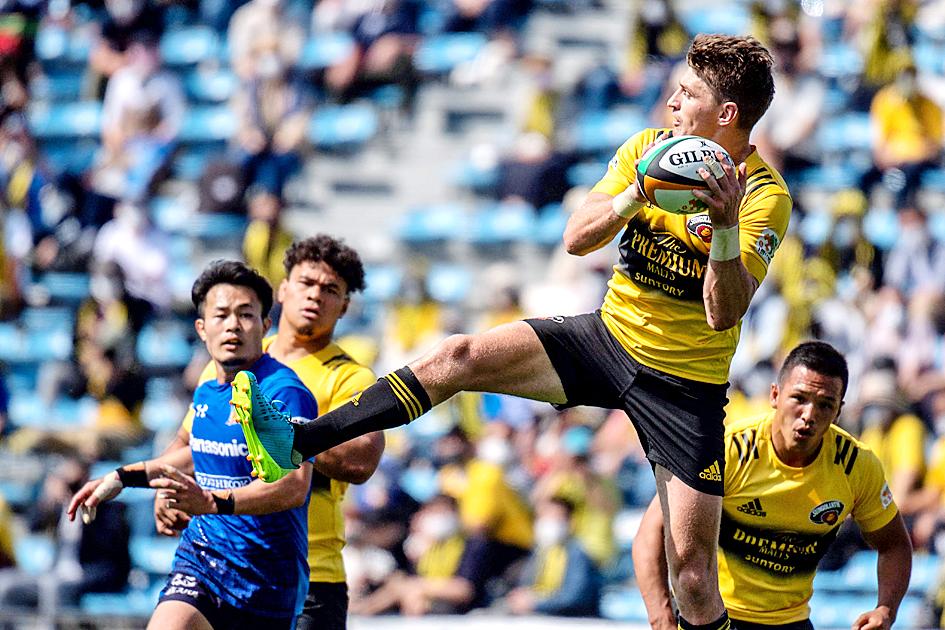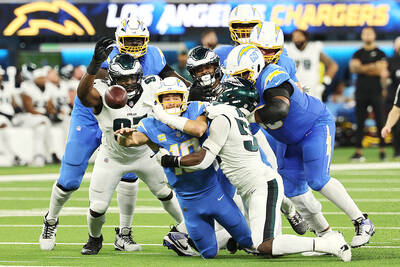Japan’s rugby union season starts tomorrow with big ambitions, tongue-twister team names and a rebrand that has left some fans wondering which version of the sport they are to be watching.
Japanese rugby chiefs want to create “the best league in the world” with 2019 World Rugby Player of the Year Pieter-Steph du Toit, and Australians Samu Kerevi and Quade Cooper among the foreign talent on show.
Organizers also plan to invite southern hemisphere teams to play Japanese clubs in special “cross-border matches.”

Photo: AFP
However, the rugby union competition’s new name — Japan Rugby League One — has confused some with its apparent reference to the 13-a-side version of the game.
Others have been left tongue-tied by rebranded team names such as NTT Communications Shining Arcs Tokyo-Bay Urayasu and NTT DoCoMo Red Hurricanes Osaka.
The three-tier Japan Rugby League One — which replaces the old Top League — is to launch with a showpiece opener at Tokyo’s Olympic stadium.
“When the opportunity came across, it was something I didn’t think twice about,” said Springbok flanker Du Toit, who has joined Toyota Verblitz.
“I think rugby at the moment in Japan is a really fast and highly skilled game, and that’s probably the way the game is going in the future,” he said.
Du Toit is one of a number of high-profile international players who have moved to Japan in the past few years.
Australia captain Michael Hooper and New Zealand’s Beauden Barrett both had stints there last season, while Rugby World Cup-winning Springboks Malcolm Marx and Willie le Roux have returned for the new campaign.
Japan Rugby League One chief operating officer Hajime Shoji said that teams would continue to lure top overseas players, who are attracted in part by the salaries on offer.
Plans are also afoot to invite southern hemisphere sides to Japan to play the league champions, he said.
“One thing that is different from what went before is that we’re looking outwards to the rest of the world and trying to connect,” he said.
Japanese clubs’ chances of signing more big names have been boosted by Australia’s loosening of the so-called “Giteau Law,” which bars overseas-based players from representing Australia unless they have appeared in at least 60 Tests.
A slight relaxation of the rule means more players are eligible to play for the Wallabies while plying their trade with teams overseas.
Kerevi, Cooper and Sean McMahon all played for Australia last year while keeping their lucrative Japanese club contracts.
While eye-catching signings have grabbed the headlines, the biggest change for Japan’s new league is the way the clubs operate.
They were previously run as divisions of corporate behemoths such as Toyota and Panasonic, and league matches were organized by the Japan Rugby Football Union.
Now, clubs are responsible for their own matchday operations and finding sponsors, and must play their games in a designated “home area,” taking steps toward finding a permanent stadium.
Clubs have also taken on new names in a bid to move them away from their corporate roots and establish ties with local communities.
The launch of the new league was delayed by the COVID-19 pandemic, but Gates believes it is not too late to regain momentum.
“I think the world has seen the growth of the Japanese national rugby team,” he said. “I think now they’re hoping the domestic competition can also make that step up.”

The pressure was already on Real Madrid coach Xabi Alonso before their 2-1 defeat to Manchester City on Wednesday in the UEFA Champions League raised further questions about his future. Arsenal remain perfect in this season’s competition and three points clear at the top of the standings after a 3-0 win against Club Brugge, while defending champions Paris Saint-Germain were held 0-0 at Athletic Bilbao. The clash between Madrid and City was the standout game of the round amid reports this week that Alonso had lost control of the locker room. Speculation over his position is likely to intensify after the latest

‘HIGH STANDARD’: The Thunder are on track for a Finals-Cup double after they scored 22 three-pointers in equaling the best 25-game start to a season in NBA history The Oklahoma City Thunder on Wednesday bagged a 16th straight victory, thrashing the Phoenix Suns 138-89 to romp into an NBA Cup semi-final clash with the San Antonio Spurs, who stunned the Los Angeles Lakers 132-119. NBA Most Valuable Player Shai Gilgeous-Alexander scored 28 points to lead the reigning NBA champions Thunder, who improved to 24-1 to equal the best 25-game start to a season in league history. They dominated from start to finish to book their place in the final four of the in-season tournament in Las Vegas, where they are tomorrow to take on the Spurs. The New York Knicks and

TOP OF THE TABLE: Evann Guessand put the visitors ahead early in the game and Flavius Daniliuc equalized before Youri Tielemans got the winner in the second half Aston Villa on Thursday extended their winning streak to eight games in all competitions with a 2-1 victory against Basel in the UEFA Europa League to secure at least a playoff spot. Villa were tied with Olympique Lyonnais, who beat Go Ahead Eagles 2-1, and Midtjylland, 1-0 winners over Genk, atop the standings of the second-tier European competition on 15 points with five wins from six games. They have bounced back from a poor start to the season and are third in the Premier League, including a 2-1 victory over leaders Arsenal on Saturday. At St Jakob-Park in Basel, summer signing Evann Guessand

Tony Jefferson intercepted a Jalen Hurts pass in overtime to give the Los Angeles Chargers a 22-19 victory over the Philadelphia Eagles on Monday in an NFL thriller between playoff contenders. Justin Herbert, playing a week after surgery on his broken left (non-throwing) hand, withstood a career-high seven sacks to throw for 139 yards and a touchdown for the Chargers. Cameron Dicker kicked five field goals, including the 54-yard game winner in overtime. The Chargers defenders forced Hurts to throw four interceptions and surrender a fumble for a career-worst five turnovers as the Eagles fell to 8-5 with a third